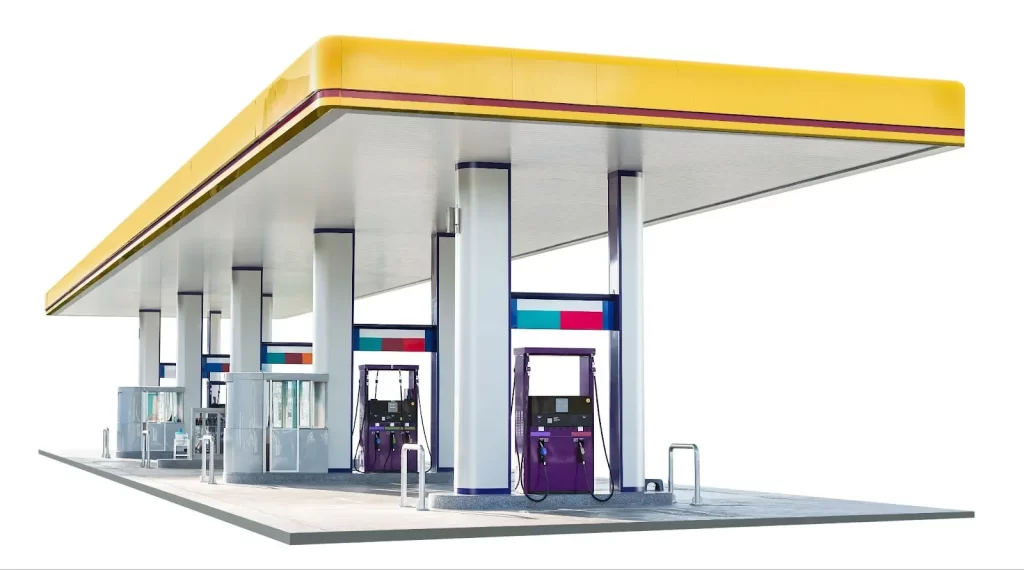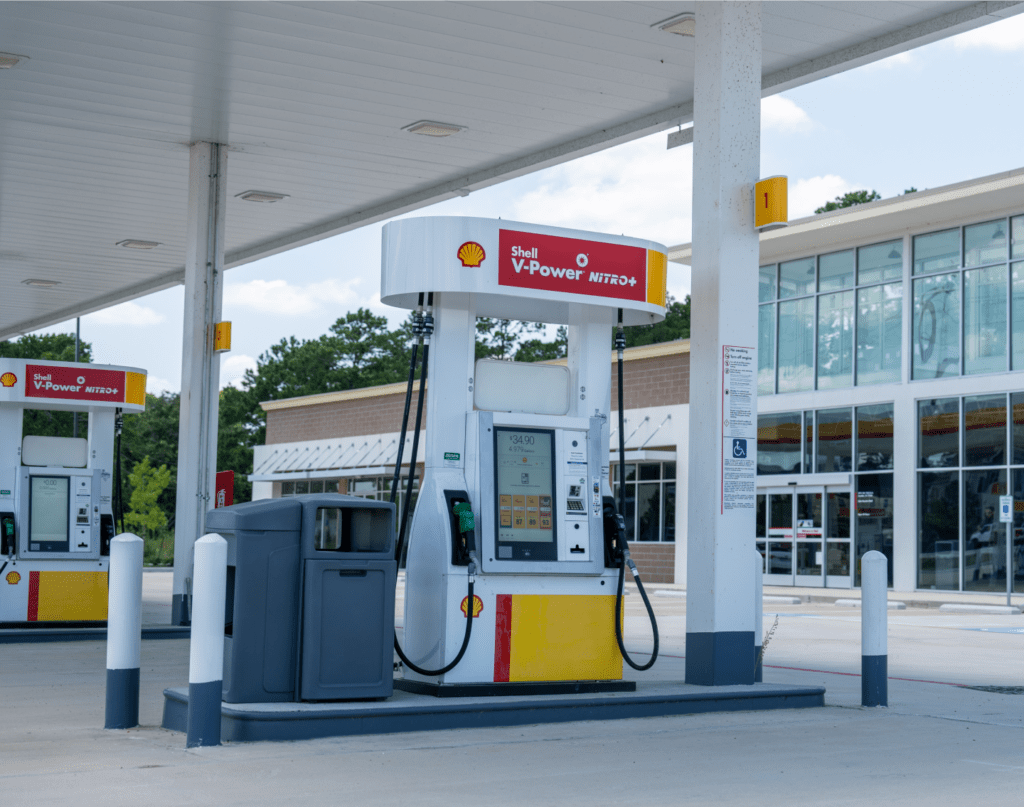
The concept of starting a gas station business can look appealing, particularly given the constant demand for fuel, regardless of the market situation.
However, transforming this concept into reality requires a thorough understanding of different cost components to guarantee a successful rollout of your gas station plan.
IS OWNING A GAS STATION A GOOD INVESTMENT?
With fuel being an essential commodity, owning a gas station has the potential to be a profitable venture. Consumer dependence on different fuel types, the strategic location of your station, and the supplementary services you offer all contribute to the business’s financial success.
HOW MUCH DOES IT COST TO BUILD A GAS STATION?
Before heading straight into the cost breakdown, it’s necessary to grasp the major components involved in establishing a gas station.
- Considering the Land’s Worth: One of the first aspects is the price of land, which varies significantly depending on its location. Prime real estate will demand higher prices but may also provide increased customer footfall.
- Estimating Construction Costs: The framework of your station forms an important part of your investment. The costs involved in constructing the station structure, including convenience stores, car wash services, and kiosks, should be included in your expense list.
- Factor in Equipment and Infrastructure: Operating a gas station requires specialized equipment and infrastructure such as fuel dispensers, underground fuel tanks, cash registers, and security systems, contributing to your overall costs.
- Legal Permissions and Local Regulations: A critical element to account for is the cost linked with securing permits for your station and ensuring that you comply with local regulations. These costs can escalate quickly, depending on your municipality’s requirements.
- Adding Extra Amenities: Some gas stations offer added amenities such as small cafes, air pumps, or even minor auto repair services. Establishing these services can add to your initial costs but may boost revenue in the long run.

BREAKDOWN OF COSTS TO BUILD A GAS STATION
Now that we’ve identified the major components, let’s delve into a detailed cost breakdown of building a gas station.
- Registering the Business: Legalizing your business is the first step. The expenses attached to business registration, including legal fees and licensing costs, should be planned ahead of time.
- Lease or Purchase Costs: Securing the property for your station, whether by lease or outright purchase, forms a significant chunk of your budget.
- Building the Gas Station: The construction costs chalked up will comprise site preparation, installation of underground storage tanks, constructing the pump island and canopy, building convenience stores, and more.
- Insuring Your Venture: Liability insurance, property insurance, and environmental insurance are among some policies you’ll need to safeguard your business, contributing to your overhead costs.
- Legal Expenses: Complying with local codes and regulations involves unavoidable legal costs, such as permit and inspection fees.
- Equipment Costs: The cost of necessary gas station equipment, such as pumps, storage tanks, and cash register systems, should be factored into your budget.
- Initial Supplies and Inventory: Stocking up your convenience store and ensuring a ready supply of fuel comprises another part of your initial expenditure.
- Transportation of Fuel: Arranging for regular fuel transport is an ongoing cost of running your station that begins even before the station starts operating.
- Workspace Setup: Office furniture and supplies are sometimes overlooked, but these costs add up and should be included in your budget.
- Setting Up Utilities: Startup costs include utilities deposit costs such as electricity, water, and internet.
- Marketing and Promotion: Advertising your new gas station to attract customers can be pricey but is a necessity for success.
- Miscellaneous Startup Costs: Lastly, always account for other startup costs such as professional fees for architects, contractors, and consultants along with emergency fund allocation.
Constructing a gas station involves numerous considerations and costs, making it a significant investment. However, with the right planning, location, and execution, profitability can be achieved.
FACTORS THAT AFFECT THE COST TO BUILD A GAS STATION
Before plunging into the journey of building your gas station, it’s a must to have an in-depth understanding of the various factors influencing the costs. These range from the type and size of your station to the location, licenses, and the number of gas pumps.
1, Category of Gas Station
The nature of your gas station is significant in determining the costs involved.
- Full-service Gas Station: Offering a high touch customer experience, full-service stations entail professional attendants who fill gas, clean windshields, check tire pressure, and offer additional services. These added services translate into higher labor costs and operational expenses.
- Self-service Gas Station: Here, customers pump their own gas. While the upfront costs might be lower due to fewer labor requirements, there may be ongoing maintenance and upgrade costs for user-friendly and efficient equipment.
- Truck Stop or Travel Plaza: These are larger facilities designed to accommodate heavy-duty vehicles, typically located near highways. While they have higher infrastructure and maintenance costs, they also offer more services and products, leading to increased revenue streams.
2. Dimension of the Gas Station
The size of your station affects construction costs, the number of needed pumps, and the potential to offer additional services and amenities.
3. Locality of Your Station
The location can greatly impact your initial and ongoing costs.
- Land Prices: In prime locations, land costs are higher but can also attract a larger customer base.
- Site Preparation: Some locations might need extensive site work, like leveling or environmental cleanup, which can enlarge your budget.
- Zoning and Permitting: Costs associated with zoning approvals and permits can fluctuate based on the local government regulations and the community’s reaction to a new gas station.
4. Fee of Licenses and Permits
Getting the requisite permissions to open your gas station involves costs that vary depending on local and state regulations.
5. Count of Gas Pumps
More pumps mean serving more customers simultaneously but also imply higher installation and maintenance costs.
6. Offered Products and Services
Offering supplementary services and products means more revenue but also more startup and operational costs.
7. Provenance of Your Supplies
Your supply costs depend on whether you join a franchise (which can involve hefty fees but provide negotiating power with suppliers) or operate independently.

BUILDING A PROFITABLE GAS STATION: ANALYZING COSTS AND ROI
Once you understand the multitude of factors affecting the cost of building a gas station, it’s time to view these costs in the light of potential returns and profitability.
1. Formulating a Detailed Business Plan
Based on the identified cost factors, create an in-depth business plan that outlines expected revenues, ongoing costs, and potential ROI. This roadmap should be realistic, flexible, and revisited regularly for adjustments.
2. Conduct a Competition Analysis
Understanding local competitors can help identify pricing tactics, popular services, and potential gaps in the market that you can capitalize on to increase your returns.
3. Implement Environment-Friendly and Energy-Efficient Technologies
Consider using energy-efficient equipment and alternative energy sources, like solar panels, which can reduce your operational costs and boost your public image, giving you a competitive edge. Additionally, explore eco-friendly offerings like electric vehicle charging stations to target a broader customer base and future-proof your business.
Considering these factors and strategies will provide you a comprehensive understanding of building a profitable gas station. Objective planning, diligent execution, and a customer-oriented approach are key drivers of success in this venture.
WHAT LOANS ARE AVAILABLE FOR A NEW GAS STATION?
When determining how to cover the cost to build a gas station, aspiring entrepreneurs often turn to various financing methods. If you’re looking to open gas stations, it’s ideal to explore all loan options available to make an informed decision on sourcing funds.
Traditional Bank Loans
Traditional bank loans are a widely accessed source for the gas station construction cost estimate. With a solid business plan, you can present your case on how much do a gas station cost to build and demonstrate your financial responsibility to prospective banks.
Small Business Administration (SBA) Loans
For those curious about how much does it cost to open a gas station, SBA loans might be the answer. Their favorable terms could significantly lower the cost of building gas station businesses from scratch, making it a popular choice for new entrants.
Private Investors
Private investors may provide substantial funds to cover the cost to build gas station facilities. Typically, these investors are interested in sharing the financial burden and profits associated with the venture.
Franchise Financing
Those eager to know how much does it cost to own a gas station might consider franchise financing. It’s an attractive solution that often includes support in fuel station construction, tied with the credibility of an existing brand.
Crowdfunding
Crowdfunding is a novel path that can help raise the gas station cost from a diverse group of supporters, mainly if your concept has a unique selling proposition or community impact.
Personal Savings
Personal savings could also form a part of your financial portfolio when evaluating how much is it to build a gas station. While personal funds might not cover all expenses, they can help reduce reliance on external financing sources.

TIPS FOR MANAGING COSTS WHEN BUILDING A GAS STATION
To ensure the cost to build a gas station remains within your financial means, consider these effective cost management tips:
Construct a Meticulous Budget
A meticulously planned budget is vital for controlling the cost of building gas station projects, ensuring you have a clear picture of how much you’ll be spending at every stage.
Compare and Negotiate with Multiple Bidders
When obtaining estimates for gas station construction costs, it’s wise to invite and negotiate bids from various sources, allowing you to secure the most favorable terms.
Design with Cost-Effectiveness in Mind
A strategic collaboration with your architects and designers can lead to a cost-effective design, which is good in keeping the overall cost to build gas station facilities under control.
Employ Strategic Project Management
Strong project management helps stick to the gas station construction cost estimate by keeping the build on schedule, preventing financial overruns.
Forge Beneficial Supplier Partnerships
Good supplier relationships are essential and can influence the total gas station cost. It’s about securing quality materials at competitive prices.
Invest in Energy Efficiency
Integrating energy-efficient choices into your gas station construction can lower operational expenses over time, a wise move when considering how much it costs to open a gas station.
Understand Regulatory Compliance
Keep abreast of regulations to avoid penalties or construction delays, especially when managing the gas station construction aspects.
ELEVATING YOUR FUEL RETAIL VENTURE WITH STRATEGIC INSIGHT
Asking “how much does it cost to open a gas station” is just the beginning. Selecting a trusted fuel distributor in Oklahoma can help answer this and more. ABC MARTS offers a Turnkey Fuel Station Development service, simplifying the fuel station construction process, and assisting you in managing the multifaceted requirements of opening gas stations. Contact us today!

